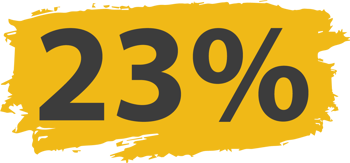
We've set out to humanize the jobseeker experience.
DEI is a crucial topic right now, but what’s the story behind the data?
Madgex answered this question with two extensive surveys focused on professionals with disabilities and Black, Indigenous and People of Color (BIPOC).
These statistics are a harrowing but honest exposure of what it's like to deal with bias and discrimination within the work place. The stats we present within the eBooks, and topics further explored in the blogs, are to uncover the issues and create useful action points that associations like yours can implement to become stronger leaders in your industry. By creating a dignified and responsive area to help all your members advance their careers you can grow ethically towards the future.
73% of professionals with disabilities surveyed were concerned that their disability might have a negative effect on their ability to successfully compete in the job market.
That’s not just another lifeless statistic – it's the life experiences of your current and prospective members.
As our extensive survey of 200+ professionals with disabilities showed, allyship is needed now.
That ally is your association.
Find out how embracing the importance of DEI along with Madgex’s career center technology can help you increase and raise member retention, engagement, satisfaction and boost revenue.

"My disability is visible and I'm afraid it may make me look like a weaker candidate than others"
- Survey participant when asked: "Are you concerned your
disability might have a negative effect on your ability to successfully compete for jobs?"
1. JOB SEARCH AND CAREER PLANNING

At the job search and career stage, professionals with disabilities made it clear that they strong valued one element when seeking a new employer: inclusion.
How so? A staggering 73% of professionals surveyed were concerned that their disability might have a negative effect on their ability to successfully compete in the job market.
Likewise, 61% also said that their career growth was negatively impacted by their disability. Not surprisingly, 82% of survey respondents said that either important or very important that an employer have a diverse and inclusive workforce.
When asked how they determined if a company was inclusive, survey respondents greatly valued social proof in the form of employee reviews.

80% stated they used employer reviews

59% looked for evidence of inclusivity in the job description or career site

67% considered a company’s culture and values

59% examined a business’ diversity of leadership and management
Our survey respondents also greatly valued transparency when seeking a place to work, with 91% saying that that transparency of pay was a factor in their decision. 84% also said that company reviews were important to them, again demonstrating the power of online social proof.
When asked to rate the following factors when looking for work, respondents cited the following factors in order of importance:

"I feel as soon as a employer knows I am on [disability], they [don't] want to hire me, because maybe they are worried if [I] can do the job, or worried and [concerned] of me putting a [disability] claim against them, or if [I'd] be more of a pain, then a good employee"
- Survey Participant when asked: "Are you concerned your disability might have a negative effect on your ability to successfully compete for jobs?"
2. THE INTERVIEW PROCESS

The interview stage is critical for any professional looking to secure a new role. The data we found in our survey further strengthened our belief that associations should foster inclusive, equitable and accessible environments for professionals with disabilities, as they made clear that they experience bias, discrimination and other challenges at this stage as well.
By creating a safe space that can help professionals with disabilities advance their careers and adopting an inclusive career center, associations can make themselves much more desirable for professionals of all backgrounds
A sizeable majority of respondents – 67% specifically – expressed concern that their disability would negatively impact their chances of securing a job interview.
Professionals with disabilities surveyed also wouldn’t hesitate to speak out if they felt like they were treated unfairly in a job interview, with 87% saying they would leave an online review of the company to inform other jobseekers. 62% said they would leave an online review informing others of a negative interview experience if they were able to do so anonymously.
In advance of a job interview, most respondents didn’t feel the need to alter their resume to hide their disability. 73% said they didn’t make any changes to their resume to hide their disability, though 13% said they hid involvement with disability groups or organizations while 9% changed their hobbies or interests.

Due to discrimination faced during a job interview,
ultimately declined a job offer.
3. THE WORKPLACE EXPERIENCE

Aside from the hiring process, many professionals with disabilities reported experiencing incidents of bias and discrimination in the workplace.
Associations in particular should heed the concerns of professionals with disabilities, as they represent the views of many current and future members. By having a stronger grasp of this data, associations can take steps to become more accessible and inclusive - boosting their membership, increasing revenue and driving member engagement, satisfaction and retention.
When asked in our survey how their employer is inclusive, those surveyed responded:
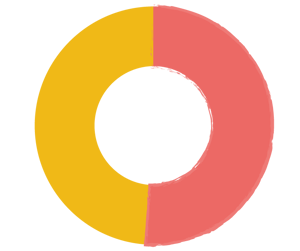
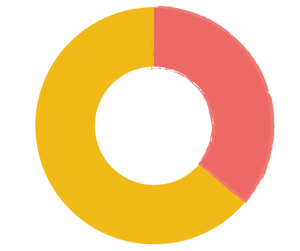
Only 51% say their employer enacts and enforces policies that provide fair treatment
36% say their employer provides diversity and accessibility training
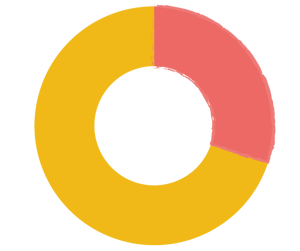
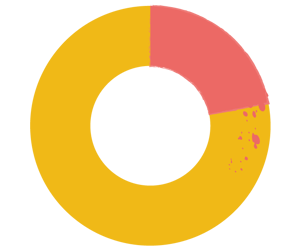
Just 30% say their employer provides necessary equipment
22% say their employer provides a support network
"It is no secret that America has an issue with racism, and I worry about being able to compete with my white counterparts."
- Survey participant when asked: "Are you concerned your ethnicity might
have a negative affect on your ability to successfully compete for jobs?"
1. JOB SEARCH AND CAREER PLANNING

At the job search and career planning stage, jobseekers and employees consistently said that they valued diversity of leadership and transparency – and want clear steps taken to address them. When asked what the most important factors were when searching for an inclusive employer, 92% of survey respondents said that transparency of pay is either important or very important to them, indicating that they’re serious about being informed of any gender or racial pay gaps and wanting employers to address them as a matter of fairness.

67% looked at a business' diversity of leadership

80% stated they used employer reviews

67% looked at an employer’s culture and values

31% sought our pay gap reports
"Asians are seen as 'perpetual foreigners' and mostly compete [with] each other for an 'international or diversity' position rather than competing with others in the larger pool. Also, people tend to underestimate language proficiency, people-skills of Asians related to work performance."
- Survey Participant when asked: "Are you concerned your ethnicity might have a negative affect on your ability to successfully compete for jobs?"

11% who leave out their hobbies and interests

24% didn't include photos of themselves

11% reported whitening their name or appearance

11% have left out any involvement with groups
40% of those surveyed said that they altered their resume or application to hide their race or ethnicity.
2. THE INTERVIEW PROCESS

During interviews, many respondents reported having been subject to bias or discrimination – something which has a key impact on the hiring process.
The fear of discrimination is very real, as 48% were concerned their race or ethnicity would negatively impact their chances of securing a job interview, with women in particular fearing discrimination and bias during the interview process. 38% reported having experienced some form of discrimination or bias during a job interview.
Notably, 14% reported they experienced positive discrimination – the practice of favoring individuals from a group discriminated against historically – in the interview process.
Professionals surveyed also strongly felt the need to speak out if they felt they were treated unfairly or discriminated against in a job interview, as 87% said they would leave an online review of the company to inform others.
This demonstrates the importance of social proof and power of online reviews among both jobseekers and employees.
19% had also declined a job offer due to discrimination during an interview – a significant portion, but also indicative that many jobseekers felt the financial security of having a salary and benefits outweighed any negative feelings of bias and discrimination during the interview process.

What are jobseekers looking for in inclusive interviews?
Respondents to our survey were asked how the interview process can be made more inclusive. Their responses focused largely on ensuring that BIPOC interviewers were included in the process.
Tip: Is your association doing enough to ensure that people of all backgrounds are represented in public-facing roles? And how are you approaching your language choices?
Here is chart showing how often words appeared in our survey answers regarding inclusive interviews.

3. DISCRIMINATION IN THE WORKPLACE

47% indicated that they’ve experienced some form of bias or discrimination in the current or prior role.
More specifically:


32% had experienced some sort of unconscious bias from colleagues while at work

23% had experienced micro aggressions

17% had experienced positive discrimination in the workplace

10% had experienced outright discrimination or conscious bias while at work
We asked our survey participants:
Do you believe your career growth opportunities are negatively affected by your ethnicity?

Because I work in the art field, it is expected of me to follow something ethnic or oriental, which is both stereotyping and limiting
Being a black woman, any time you try to lead anyone, you are considered "bossy" or "aggressive"
Diversity initiatives favor minority groups like blacks, latinos, LGBTQ over minority groups like Asians
As a Latinx, I'm expected to be less professional than white applicants
Not white enough and not black enough to progress

-
Watch our unique gathering of DEI experts
We brought together a brilliant panel of specialists in DEI to discuss
the impact it has on associations
For all leaders of associations looking to drive value for their BIPOC members, give this panel a watch... Speakers: Amber Cabral, Author and TED Key Note Speaker | Dawn Harris, Director of Diversity & Inclusion at CFP Board | Zahra Clayborne, PhD candidate at UOttawa and research participant | Maria Sucher, BOD and Latinos Alumni Network Founder at UMass





